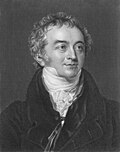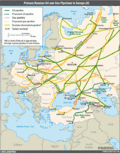Portal:Energy
| Main page | New articles & Tasks |
 The Energy Portal Welcome to Wikipedia's Energy portal, your gateway to energy. This portal is aimed at giving you access to all energy related topics in all of its forms.
|
Page contents: Selected article • Selected image • Selected biography • Did you know? • General images • Quotations • Related portals • Wikiprojects • Major topics • Categories • Help • Associated Wikimedia |
Introduction
Energy (from Ancient Greek ἐνέργεια (enérgeia) 'activity') is the quantitative property that is transferred to a body or to a physical system, recognizable in the performance of work and in the form of heat and light. Energy is a conserved quantity—the law of conservation of energy states that energy can be converted in form, but not created or destroyed. The unit of measurement for energy in the International System of Units (SI) is the joule (J).
Forms of energy include the kinetic energy of a moving object, the potential energy stored by an object (for instance due to its position in a field), the elastic energy stored in a solid object, chemical energy associated with chemical reactions, the radiant energy carried by electromagnetic radiation, the internal energy contained within a thermodynamic system, and rest energy associated with an object's rest mass. These are not mutually exclusive.
All living organisms constantly take in and release energy. The Earth's climate and ecosystems processes are driven primarily by radiant energy from the sun. The energy industry provides the energy required for human civilization to function, which it obtains from energy resources such as fossil fuels, nuclear fuel, and renewable energy. (Full article...)
Selected article
Solar power, also known as solar electricity, is the conversion of energy from sunlight into electricity, either directly using photovoltaics (PV) or indirectly using concentrated solar power. Solar panels use the photovoltaic effect to convert light into an electric current. Concentrated solar power systems use lenses or mirrors and solar tracking systems to focus a large area of sunlight to a hot spot, often to drive a steam turbine.
In 2024, solar power generated 6.9% (2,132 TWh) of global electricity and over 1% of primary energy, adding twice as much new electricity as coal. Along with onshore wind power, utility-scale solar is the source with the cheapest levelised cost of electricity for new installations in most countries. As of 2023, 33 countries generated more than a tenth of their electricity from solar, with China making up more than half of solar growth. Almost half the solar power installed in 2022 was mounted on rooftops. (Full article...)
Selected image

Photo credit: From an image by Wolfgang Beyer
Strombolian volcanic eruptions can eject incandescent cinder, lapilli and lava bombs to altitudes of tens to hundreds of meters.
Did you know?

- Buildings constructed to the German Passivhaus standard use 75% to 95% less energy for space heating and cooling than current new buildings in the United States?
- Crossing 4,000 km (2,500 miles), the Druzhba pipeline is the world's longest oil pipeline?
- Coal is ground to a powder before being burnt in fossil fuel power plants?
- Compact fluorescent lamps (pictured) use about 1/4 of the energy of normal incandescent light bulbs, and pay for themselves after about 500 hours of use?
- Nuclear power in France produces 78% of all the country's electricity - more than in any other nation?
- Positive lightning bolts are typically six to ten times more powerful than normal lightning — and aircraft are not designed to withstand them?
- Dark energy is a hypothetical form of energy which permeates all of space?
Selected biography
Born in Ireland, Thomson studied at the University of Glasgow, Scotland. On graduating, he became a mathematics teacher at the Royal Belfast Academical Institution. During his life Thomson published more than 600 scientific papers and filed over 70 patents.
As early as 1845 Thomson pointed out that the experimental results of William Snow Harris were in accordance with the laws of Coulomb. Over the period 1855 to 1867, Thomson collaborated with Peter Guthrie Tait the Treatise on Natural Philosophy that unified the various branches of physical science under the common principle of energy. His inventions included the current balance for the precise specification of the ampere, the standard unit of electric current.
In 1893, Thomson headed an international commission to decide on the design of the Niagara Falls power station. Despite his previous belief in the superiority of direct current electric power transmission, he agreed to use alternating current after seeing a Westinghouse demonstration at the Chicago World's Fair.
General images
Quotations
- "My administration is committed to a leadership role on the issue of climate change. We recognize our responsibility and will meet it - at home, in our hemisphere, and in the world." – George W. Bush, 2001
- "While the Kyoto Protocol is a crucial step forward, that step is far too small. And as we consider how to go further still, there remains a frightening lack of leadership." – Kofi Annan, 2006
- "It is going to be very difficult to keep temperature increases down to between 2 and 3 degrees centigrade [3.6 - 5.4°F]. We should work very hard to do that." – Nicholas Stern, 2006
- "Halting global warming requires urgent, unprecedented international cooperation, but the needed actions are feasible and have additional benefits for human health, agriculture and the environment." – James E. Hansen, 2004
Related portals
WikiProjects
WikiProjects connected with energy:
Other WikiProjects that may be of interest:
Major topics
Major categories
National energy supply, use & conservation
National electricity sector
Politics, economics, environment
- Climate change
- Energy conservation
- Energy economics
- Energy crises
- Energy development
- Energy policy
- Peak oil
Energy sources
- Fuels
- Biofuels
- Fossil fuels
- Fusion power
- Nuclear technology
- Renewable energy
- Energy conversion
- Electric power
- Energy storage
Energy-related design
Scientific usage
Help

Puzzled by energy?
Can't answer your question?
Don't understand the answer?
- Ask at the reference desk
- Read the Wikipedia help pages
For further ideas, to leave a comment, or to learn how you can help improve and update this portal, see the talk page.
Associated Wikimedia
The following Wikimedia Foundation sister projects provide more on this subject:
-
Commons
Free media repository -
Wikibooks
Free textbooks and manuals -
Wikidata
Free knowledge base -
Wikinews
Free-content news -
Wikiquote
Collection of quotations -
Wikisource
Free-content library -
Wikiversity
Free learning tools -
Wiktionary
Dictionary and thesaurus



























































































































































































